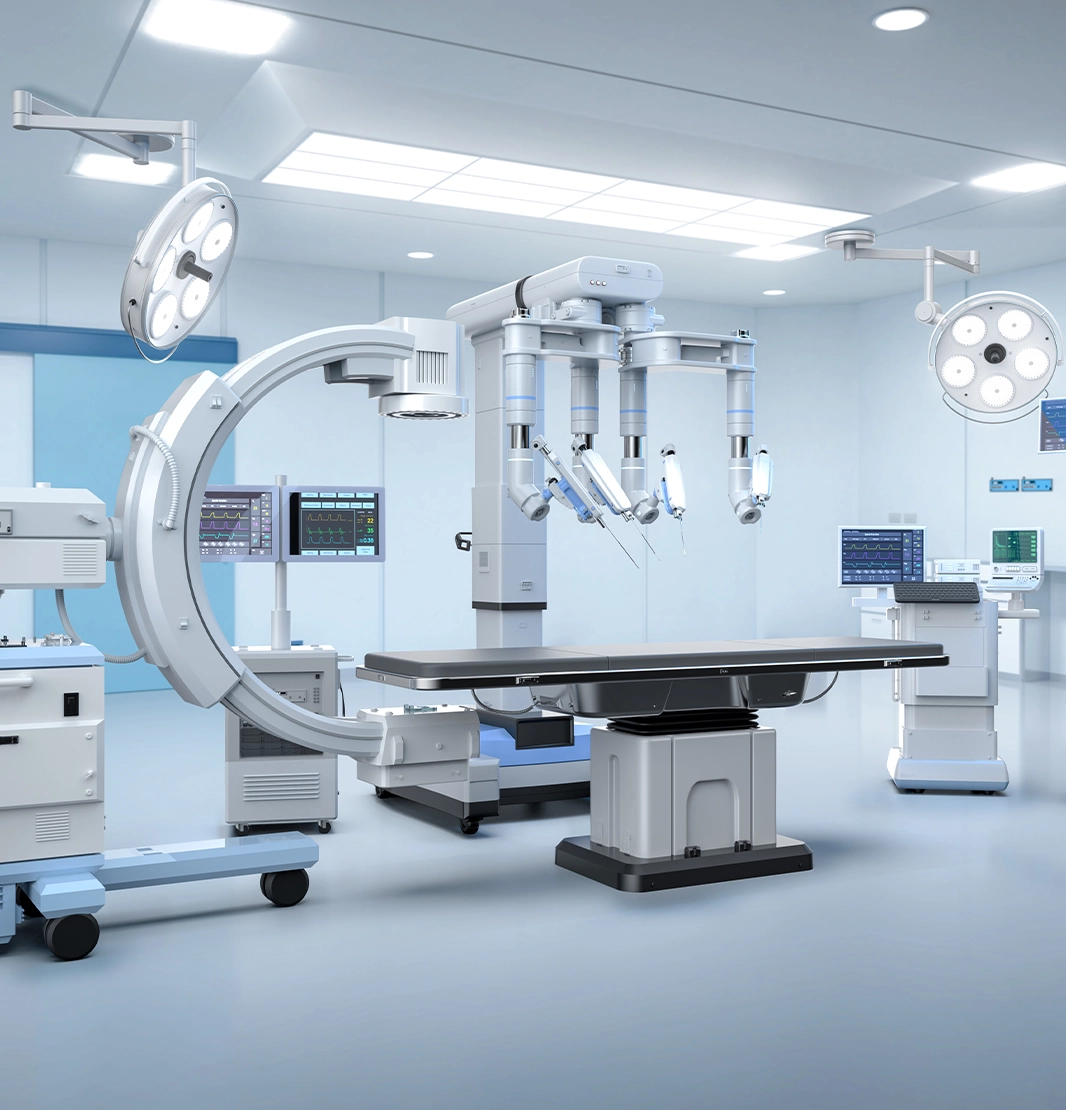
Welcome to Bhagwan Mahaveer Cancer Hospital & Research Centre (BMCHRC), a beacon of hope and healing for individuals confronting Interventional Procedures. Our institution stands as a pillar of comprehensive care, where cutting-edge treatments merge with compassionate support to guide patients towards optimal health outcomes.
Welcome to BMCHRC's Interventional Procedures department, where we specialize in minimally invasive techniques to diagnose and treat a wide range of medical conditions. Our team of highly skilled specialists, state-of-the-art equipment, and patient-centric approach ensure that our patients receive safe, effective, and compassionate care.

At BMCHRC, we employ advanced minimally invasive procedures to diagnose and treat various medical conditions with precision and minimal disruption to the patient's body. These techniques often involve using imaging guidance, such as fluoroscopy, ultrasound, or CT scans, to target specific areas of concern and deliver targeted treatments with precision.

Our Interventional Procedures department offers a comprehensive range of minimally invasive procedures across multiple medical specialties, including cardiology, radiology, neurology, oncology, and more. From angioplasty and stent placement to nerve blocks and tumor ablations, we provide cutting-edge interventions tailored to each patient's unique needs.

Our team of interventional specialists comprises board-certified physicians, surgeons, radiologists, and other healthcare professionals with extensive training and experience in interventional techniques. With a focus on collaboration and multidisciplinary care, our experts work together to deliver personalized treatment plans and optimize patient outcomes.

BMCHRC is equipped with state-of-the-art facilities and advanced medical equipment to support our interventional procedures. From dedicated procedure rooms to high-resolution imaging systems, we have the resources necessary to perform complex interventions safely and effectively.

Minimally invasive interventional procedures offer several advantages over traditional surgical techniques, including reduced risks of complications, shorter recovery times, and minimal scarring. Our team takes every precaution to minimize risks and ensure patient safety throughout the procedure and recovery process.

We believe in a collaborative approach to patient care, involving patients, their families, and other healthcare providers in the decision-making process. Our team works closely with referring physicians and other specialists to coordinate care, optimize treatment outcomes, and provide comprehensive support to our patients.
.webp)
At BMCHRC, we are committed to continuous quality improvement in our interventional procedures department. We regularly review outcomes, evaluate new technologies and techniques, and incorporate feedback from patients and staff to enhance the quality, safety, and effectiveness of our services.
We understand that undergoing an interventional procedure can be a stressful experience for patients and their families. That's why we provide comprehensive patient education and support services to help patients understand their condition, prepare for the procedure, and navigate the recovery process with confidence.
Meet our esteemed team of medical professionals, each equipped with years of specialized expertise and unwavering dedication to patient care.
Request a callback from our healthcare specialist
Interventional procedures are minimally invasive techniques used to diagnose and treat various medical conditions. They are often recommended when traditional treatments are not effective or when surgery is not feasible. These procedures typically involve using imaging guidance to target specific areas of concern and deliver treatments directly to the affected area.
BMCHRC offers a wide range of interventional procedures across multiple medical specialties, including cardiology, radiology, neurology, oncology, and more. Some common procedures include angioplasty, stent placement, nerve blocks, joint injections, tumor ablations, and catheter-based treatments.
Interventional procedures are minimally invasive and typically involve smaller incisions, less tissue damage, and faster recovery times compared to traditional surgery. They often do not require general anesthesia and can be performed on an outpatient basis, allowing patients to return home the same day.
Yes, interventional procedures are generally safe when performed by skilled healthcare professionals in appropriate clinical settings. Our team at BMCHRC follows strict safety protocols and guidelines to minimize risks and ensure patient safety throughout the procedure and recovery process.
During an interventional procedure, you will be provided with detailed instructions and information about the procedure beforehand. Depending on the type of procedure, you may receive local anesthesia or mild sedation to ensure your comfort. The procedure itself will be performed with precision and care by our expert team using advanced imaging guidance.
The duration of an interventional procedure varies depending on the complexity of the procedure and the patient's individual circumstances. Some procedures may take only a few minutes, while others may take several hours. Our team will provide you with an estimate of the procedure duration beforehand.
Our team at BMCHRC takes every precaution to minimize pain and discomfort during interventional procedures. Depending on the procedure, you may experience some mild discomfort or pressure, but our staff will ensure that you are as comfortable as possible throughout the process. Pain management options will be discussed with you before the procedure.
The recovery time after an interventional procedure varies depending on the type of procedure and individual patient factors. Some procedures may allow for immediate return to normal activities, while others may require a period of rest and recovery. Our team will provide you with specific post-procedure instructions and guidance on resuming activities.
While interventional procedures are generally safe, there are some risks associated with any medical procedure. These risks may include bleeding, infection, allergic reactions, and damage to surrounding tissues or organs. Our team will discuss potential risks and complications with you before the procedure and take steps to minimize them.
Depending on the type of procedure and any sedation or anesthesia involved, you may be instructed to avoid eating or drinking for a certain period before the procedure. Our team will provide you with specific fasting instructions based on your individual circumstances.
In some cases, patients may require mild sedation or anesthesia for an interventional procedure, which can impair driving ability. If sedation or anesthesia is used, you will need to arrange for someone to drive you home after the procedure. Our team will provide you with detailed instructions regarding transportation and post-procedure care.
While patients may have preferences or opinions about their medical care, the decision to recommend a specific interventional procedure is based on a thorough evaluation of your medical condition, symptoms, and treatment goals by our healthcare team. We encourage open communication and collaboration with our patients to ensure that their concerns and preferences are addressed.
Our team will provide you with detailed pre-procedure instructions, including any fasting requirements, medications to take or avoid, and what to expect on the day of the procedure. It's essential to follow these instructions carefully to ensure the procedure is safe and effective.
Coverage for interventional procedures may vary depending on your insurance provider, the specific procedure being performed, and your individual insurance plan. Our billing department can assist you in understanding your insurance coverage and any out-of-pocket expenses you may incur.
To schedule an interventional procedure at BMCHRC, you will need a referral from your primary care physician or specialist. Once you have a referral, you can contact our scheduling department to arrange an appointment. Our team will work with you to schedule the procedure at a convenient time and provide you with all the information you need to prepare.